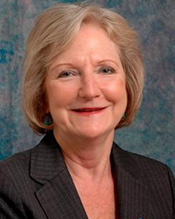
American Diabetes Association lowers target HbA1C levels for children with type-1 diabetes in order to get stricter HbA1C control among these patients. Read more

American Diabetes Association lowers target HbA1C levels for children with type-1 diabetes in order to get stricter HbA1C control among these patients. Read more
 The Inaugural Dr. Barbara J. Anderson lecture was held on October, 27. This lectureship was created to honor Barbara J. Anderson, Ph.D., associate head of the Section of Psychology and professor of Pediatrics, who recently retired after 15 years on faculty at Baylor College of Medicine and Texas Children’s Hospital. Dr. Anderson’s contributions to the diabetes community and behavioral science over her 40-year career have been invaluable to advancing research and practice in pediatric diabetes and supporting the careers of many scientists and providers in academic medicine. Prior to her time in Houston, she was on faculty at Washington University School of Medicine, the University of Michigan, and Harvard Medical School/Joslin Diabetes Center. Dr. Anderson has had continuous grant support from the National Institutes of Health, the Leona M. and Harry B. Helmsley Charitable Trust, JDRF, and other funders since 1979.
The Inaugural Dr. Barbara J. Anderson lecture was held on October, 27. This lectureship was created to honor Barbara J. Anderson, Ph.D., associate head of the Section of Psychology and professor of Pediatrics, who recently retired after 15 years on faculty at Baylor College of Medicine and Texas Children’s Hospital. Dr. Anderson’s contributions to the diabetes community and behavioral science over her 40-year career have been invaluable to advancing research and practice in pediatric diabetes and supporting the careers of many scientists and providers in academic medicine. Prior to her time in Houston, she was on faculty at Washington University School of Medicine, the University of Michigan, and Harvard Medical School/Joslin Diabetes Center. Dr. Anderson has had continuous grant support from the National Institutes of Health, the Leona M. and Harry B. Helmsley Charitable Trust, JDRF, and other funders since 1979.
The honored speaker at the Inaugural Anderson lecture was Randi Streisand, Ph.D., professor of Psychology and Behavioral Health and director of Psychology Research at Children’s National Medical Center (Washington, DC). Dr. Streisand is an internationally recognized expert in parenting stress and support in families of children with type 1 diabetes. Her lecture, “The Shared Lived Experience: What Parenting Coaching Can Add to a Behavioral Intervention,” recognized Dr. Anderson’s early contributions to the field that acknowledged the importance of supporting parents and families of children with chronic medical conditions including diabetes. Dr. Streisand reviewed literature about peer parent mentoring across pediatric chronic conditions and illustrated the implementation of Peer Coach strategies as part of her program of behavioral intervention research with parents of young children with type 1 diabetes. In addition to her lecture, Dr. Streisand met with collaborators at Baylor College of Medicine/Texas Children’s Hospital and led professional mentoring sessions with behavioral researchers and clinical faculty in the Section of Psychology.
The Barbara J. Anderson lecture will occur annually, highlighting leaders in pediatric, child clinical, and neuropsychology to honor the professional legacy of Dr. Anderson’s widespread contributions to the field.
More than 300 patients and family members attended the Di-A-Boo-Tes Bash on October 21 at the Houston Health Museum. Hosted by Texas Children’s Hospital’s Diabetes Clinic, more than 70 vendors participated in the event, meant to provide patients with a way to celebrate Halloween and highlight diabetes awareness to the community.
 Texas Children’s is the honored sponsor for every Tuesday’s “Houston Legends” series. We will showcase the legendary care Texas Children’s has provided since 1954, and focus on milestone moments in our unique history. Also, a complementary website offers a more detailed look at our past, our story and our breakthroughs.
Texas Children’s is the honored sponsor for every Tuesday’s “Houston Legends” series. We will showcase the legendary care Texas Children’s has provided since 1954, and focus on milestone moments in our unique history. Also, a complementary website offers a more detailed look at our past, our story and our breakthroughs.
On the right is the Texas Children’s ad that is featured in this week’s Chronicle. Click the ad to visit our companion website at texaschildrens.org/legendarycare. The website will change weekly to complement the newspaper ad, which will be published in section A of the Chronicle on Tuesdays for the next several weeks. We also will spotlight this special feature weekly on Connect, so stay tuned to learn and share our rich history.

On 14 West Tower, there is a new four-bed unit designated solely for diabetes patients who visit our hospital’s inpatient units. It’s a small area that’s going to make a big difference, maybe even help save lives.
The plans for the unit began as part of Delivering On the Vision (DOTV), the hospital wide effort to impact patient care and outcomes. DOTV created a Care Process Team to combat Diabetic Ketoacidosis or DKA. DKA is a life-threatening condition that diabetics encounter which could affect morbidity and mortality. The team discussed the work processes and potential areas of focus for quality improvement, deciding that a diabetes center of excellence was vital in improving our patient care and outcomes for diabetic patients.
“The dedicated Diabetes Care Unit allows for highly specialized care by a cohesive, expert team in a location where care is brought to the patient,” said Rhonda Wolfe, who is leading the Care Process Team along with Dr. Rona Sonabend. “The impact of a highly trained, expert team will mean improved quality, decreased length of stay, better preparation for discharge and ultimately better outcomes for our patients and families.”
Bedside nurses received advanced training to enhance their expertise with this patient population. This team is able to provide focused, expert care, involving all disciplines and providing a care model that is accessible, regardless of time of day or day of the week.
The team continues to receive ongoing training and will prepare for higher acuity patient admissions to the Diabetes Care Unit this coming fall.